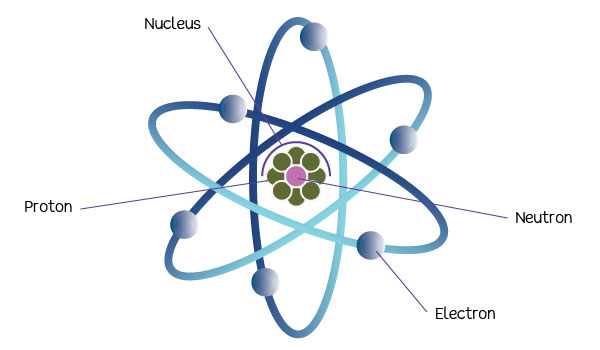- Kinds of energy
What is Nuclear Energy?
Let us begin with the atom, the nucleus, and then the energy part!
Atom
Matter (everything in this world) is composed of atoms. Atoms are so tiny that the eye cannot see. We can see them by using powerful magnifying tools. In the center of this atom is the nucleus.

Nuclear Energy
Generally, nuclear is a term for activities that occur within the nucleus of atoms. So, from that concept, Nuclear energy is energy from the activities in the core (nucleus) of the atom. This energy, however, needs to be harnessed for it to become useful to us. So we will begin by learning two words: Fusion and Fission.
Fusion and Fission
In simple terms, heat is produced when atoms combine (Fusion) or when atoms split (Fission). Fusion results in a bigger atom and Fission results in even smaller atoms. For this lesson, we will focus on Fission, as it is the type that has been harnessed to produce electricity.
There are some naturally occurring and man-made materials that have relatively unstable (unstable means they have a lot of energy) atomic structures, making them very good for fission. Examples of these materials are Uranium and Plutonium.
Notes:
Uranium is a naturally occurring metallic chemical found on the earth’s crust. It is denoted by the letter ‘U’. Although it is non-renewable, it is the most commonly used nuclear fuel in commercial power plants.
Nuclear fission can occur naturally in a process called Radioactive Decay. Humans can also induce fission is a process called Nuclear reaction. A nuclear reaction is important because it is the process that we have used to create electricity. It is the process by which we harness the energy from atoms.
Nuclear Reaction
A Nuclear Reaction is a process that occurs in a steel vessel or chamber called a Nuclear Reactor. In the reactor, the uranium atoms are forced to split, producing massive heat. When the atoms split, they release neutrons, which are absorbed by other atoms. The repeated activity of splitting and absorption causes a chain reaction which is very important for the process to continue. Sometimes, free neutrons from the fission process scatter and are lost (leakage). When enough neutrons are produced and absorbed, the system is said to be Critical (or have reached Criticality). Other important terms are Sub-Critical (when neutron produced are less than neutrons absorbed) and Super-Critical (when neutron produced are more than neutrons absorbed).
